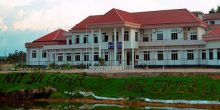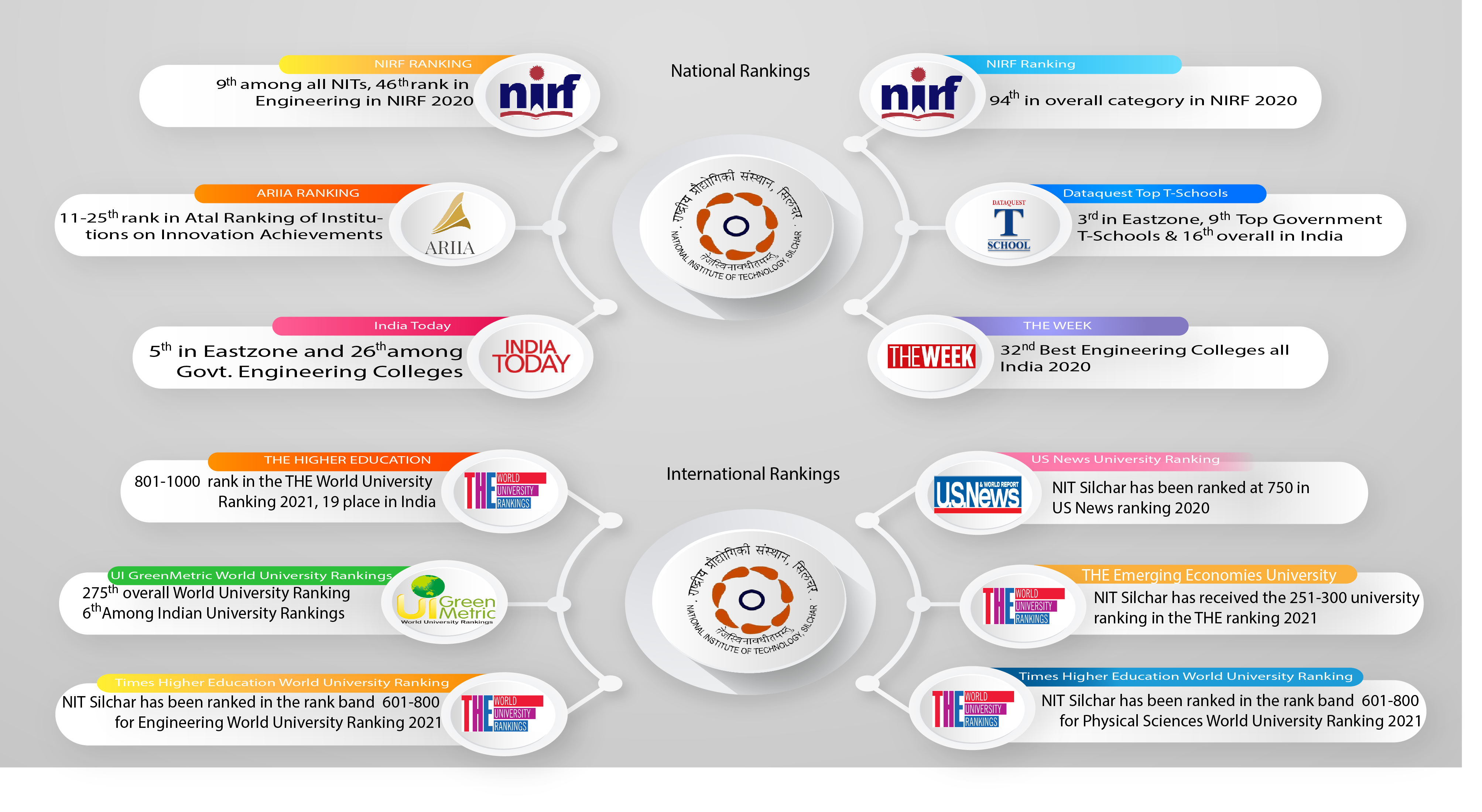National Institute of Technology NIT Silchar

National Institute Of Technology NIT Silchar (राष्ट्रीय प्रौद्योगिकी संस्थान, सिलचर) is one of the 30 National Institutes of Technology of India and was established in 1967 as a Regional Engineering College in Assam. In 2002 it was upgraded to the status of National Institute of Technology and was declared as Institute of National Importance under the National Institutes of Technology Act, 2007.
History of National Institute of Technology NIT Silchar
In the late fifties, the Government of India decided to establish Regional Engineering Colleges (RECs) under the Quality Technical Education Policy – one each in every major state – with the prime objective of imparting quality technical education throughout the country and to foster national integration. These Regional Engineering Colleges were established as joint ventures of the Government of India and the respective State Governments. Assam is considered as the flag bearer of the Northeast India and so in the year 1967 the 15th REC was officially established in Silchar. However it took almost a decade for REC Silchar to start its academic programmes due to various constraints.
The first batch of students were admitted in 1977 in the BE program in 3 branches of engineering namely, Civil Engineering, Mechanical Engineering, and Electrical Engineering. The total intake in the first batch was 60 students. The inadequate infrastructure facilities consisted of only a part of a hostel, two Assam type buildings (for classes and administration), a workshop building, seven faculty quarters and a few staff quarters when the College started its academic programme in November 1977. Initially under the guidance of the then Principal Dr. H. R. Chablani, the classes started with only four full time Faculty members. The College started its academic programme with affiliation from Gauhati University. The first batch of BE students were awarded degrees in the year 1982-83. Subsequently, two more branches, namely, Electronics and Telecommunication Engineering, and Computer Science and Engineering started functioning from the year 1983 and 1987, respectively. The affiliation was later shifted to Assam University in 1994.
On the basis of the report of the High Powered Joint Expert Committee of AICTE and UGC under the chairmanship of Prof. S. K. Joshi, Director General of Council for Scientific and Industrial Research (CSIR), Regional Engineering College Silchar has been transformed and upgraded to National Institute of Technology, Silchar with the status of Deemed University on 28th June 2002. The institute has been taken over by Government of India and subsequently made into a fully funded Central Government Autonomous Institution. This ensures a better financial status for NIT Silchar and will accelerate its growth ensuring that it becomes one of the premier technological institutes of not just the North- East but the entire nation. The institute has remodeled its curriculum and academic activities in line with that of the IITs. With its Deemed University status, the institute started awarding degrees from the year 2002 and the first convocation of the institute was held on 16 February 2004. The Government of India declared the Institute as an Institute of National Importance by enacting the National Institutes of Technology Act 2007.
Under Graduate Programmes at National Institute of Technology Silchar
The duration of the programme leading to B.Tech.degree is four years. The curricula for the different degree programmes as proposed by the respective departments and recommended by the Departmental Undergraduate Programme Committee (DUPC) shall have theapproval of the Senate. The departments would also prepare the syllabus of each subject containing the scope of studies and detailed instructions to be imparted which must have the approval of the Senate.
All subjects would have a lecture-tutorial-practical (laboratory/sessional) component (L-T-P) to indicate the contact hours. The tutorial (T) or practical/ Sessional (P) component may be absent in certain courses. Separate laboratory subjects (0-0-P) may exist in certain cases as decided by the Senate on the recommendation of the DUPC. All subjects will have a credit count ‘C’. Teaching of subjects will be reckoned in terms of credits. One hour lecture or tutorial class is designated as 2 credits while one hour practical class is designated as one credit.
In each of the first year/ second year, there shall be non-credit compulsory Extra Academic Activity (EAA). The Extra Academic Activity may be N.S.S., N.C.C., or any other physical education. The curricula for B.Tech.programme includes compulsory Industrial training of 6-8 weeks duration after 6th semester in any reputed industry, research organization, IIT’s and other reputed institutions which is assessed in the 7th Semester. The Project work will carry a total of 15-20 credits.
 B.Tech. 3rd Semester Course Structure wef 2018-19 entry batch
B.Tech. 3rd Semester Course Structure wef 2018-19 entry batch
 Course Structure & Syllabus of UG 1st, 2nd & 3rd Semester effective wef 2018-19
Course Structure & Syllabus of UG 1st, 2nd & 3rd Semester effective wef 2018-19
 B.Tech. Course Curriculum, CSE
B.Tech. Course Curriculum, CSE
 B.Tech. Course Curriculum, ECE
B.Tech. Course Curriculum, ECE
 B.Tech. Course Curriculum, EE
B.Tech. Course Curriculum, EE
 B.Tech. Course Curriculum, EI
B.Tech. Course Curriculum, EI
 B.Tech. Course Curriculum, ME
B.Tech. Course Curriculum, ME
 B.Tech. Course Curriculum, CE
B.Tech. Course Curriculum, CE
Post Graduate Programmes at National Institute of Technology Silchar
Teaching for the courses is reckoned in credits. Due credit is given to lecture, tutorial (theory) and practical components for a given subject. Normally for M.Tech., first two semesters have theory and practical (laboratory) subjects while for MSc/MBA, theory courses are taught in all the semesters.
The 3rd and 4th semester mostly constitute the project work for M.Tech. while for M.Sc/MBA, the project work spans over the fourth semester. MBA students undergo a compulsory summer internship after second semester.
Project work and Seminar are essential part of the curricula. Class tests, assignments, tutorials, vivavoce, laboratory assignments, etc., are the constituent components of continuous assessment process and a student must fulfil all these requirements as prescribed by the teacher/coordinator of the subject.
 PG 1st semester Course Curriculum & Syllabus effective from 2019 entry batch
PG 1st semester Course Curriculum & Syllabus effective from 2019 entry batch

Webpage :
For Similar Colelges, Please visit :
https://merocollege.com/country/study-in-india/
Offered Courses:
- Bachelor's Level
- Computer/IT & Related Subjects
- Engineering
- Master's Level
- Computer/IT & Related Subjects
- Engineering
© 2020 All Rights Reserved